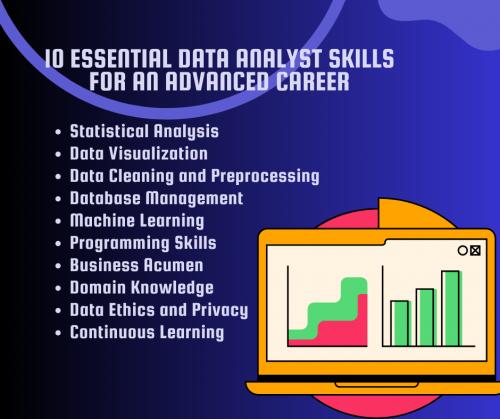10 Essential Data Analyst Skills for an Advanced Career

In today's
data-driven landscape, the role of a data analyst has assumed ever-increasing
significance across diverse industries. Data analysts bear the responsibility
of transforming raw data into invaluable insights, thereby facilitating
informed decision-making and propelling organizational growth. While
entry-level data analyst positions may necessitate a foundational skillset,
progression in this field demands a deeper and broader range of competencies.
In this article, we will delve into the 10 essential data
analyst skills that you must possess to advance in your careers.
Top 10 Essential Data Analyst Skills
Statistical Analysis
At the core
of data analysis lies statistical proficiency. Data analysts must excel in
statistical methods and tools to derive meaningful insights from data.
Proficiency in hypothesis testing, regression analysis, and probability theory
is imperative. Familiarity with statistical analysis tools like Python and R is
advantageous.
Data Visualization
Data's worth
is contingent on its presentation. Data analysts must be adept at crafting
engaging visualizations that elucidate complex data. Proficiency in data visualization
tools such as Tableau, Power BI, or Python libraries like Matplotlib and
Seaborn is vital.
Data Cleaning and Preprocessing
Data seldom
arrives in perfect form. Before commencing analysis, data analysts must
undertake data cleaning and preprocessing to eliminate outliers, address
missing values, and uphold data quality. Proficiency in these processes is
foundational to the role of a data analyst.
Database Management
Data
analysts often grapple with extensive datasets stored in databases. Comprehending
how to query databases using SQL (Structured Query Language) is imperative.
Familiarity with NoSQL databases like MongoDB can also be beneficial,
contingent on the specific industry.
Machine Learning
As data
analysis advances, machine learning has become integral to the discipline.
While not every data analyst needs to be a machine learning expert, a basic
grasp of machine learning concepts and algorithms can be highly advantageous.
Familiarity with machine learning libraries in Python, such as scikit-learn, is
a plus.
Programming Proficiency
Data
analysts should possess programming skills, particularly in languages like
Python or R. These languages are widely employed in data analysis for data
manipulation, statistical analysis, and the construction of data pipelines. The
ability to script custom solutions and automate data-related tasks can yield
substantial time and effort savings.
Business Acumen
Data
analysts are more than just number-crunchers; they are strategic thinkers.
Grasping the business context and objectives is essential for providing
actionable insights. Effective communication with non-technical stakeholders
and the capacity to translate data findings into business recommendations
constitute valuable skills.
Domain Knowledge
A profound
understanding of the industry or domain in which one operates can distinguish a
data analyst. Appreciating the nuances of industry-specific data and the
challenges it presents enables one to pose pertinent questions and provide more
meaningful insights.
Data Ethics and Privacy
In an era
characterized by heightened data regulation and ethical concerns, data analysts
must be cognizant of data ethics and privacy considerations. Understanding the
legal and ethical ramifications of working with data, particularly personal or
sensitive information, is paramount.
Continuous Learning
The field of
data analysis is in a perpetual state of evolution. Novel tools, techniques,
and technologies surface regularly. A commitment to ongoing learning is
indispensable for staying relevant and advancing in one's data analyst career.
This commitment may entail enrolling in courses, participating in workshops, or
simply staying abreast of industry publications and blogs.
Conclusion
Ascending to
the status of an advanced data analyst, necessitates more than just
foundational skills. It demands a comprehensive skillset encompassing
statistical analysis, data visualization, data cleaning, database management,
machine learning, programming, business acumen, domain knowledge, data ethics,
and a dedication to continuous learning. The development of these proficiencies
will not only enhance your value to your organization but also unlock doors to
more challenging and rewarding opportunities within the dynamic realm of data
analysis.
Whether you
aspire to embark on a career as a data analyst or seek to elevate your current
role, enrolling in a data
analyst certification course is the key to success in our data-centric
world.
Post Your Ad Here
Comments